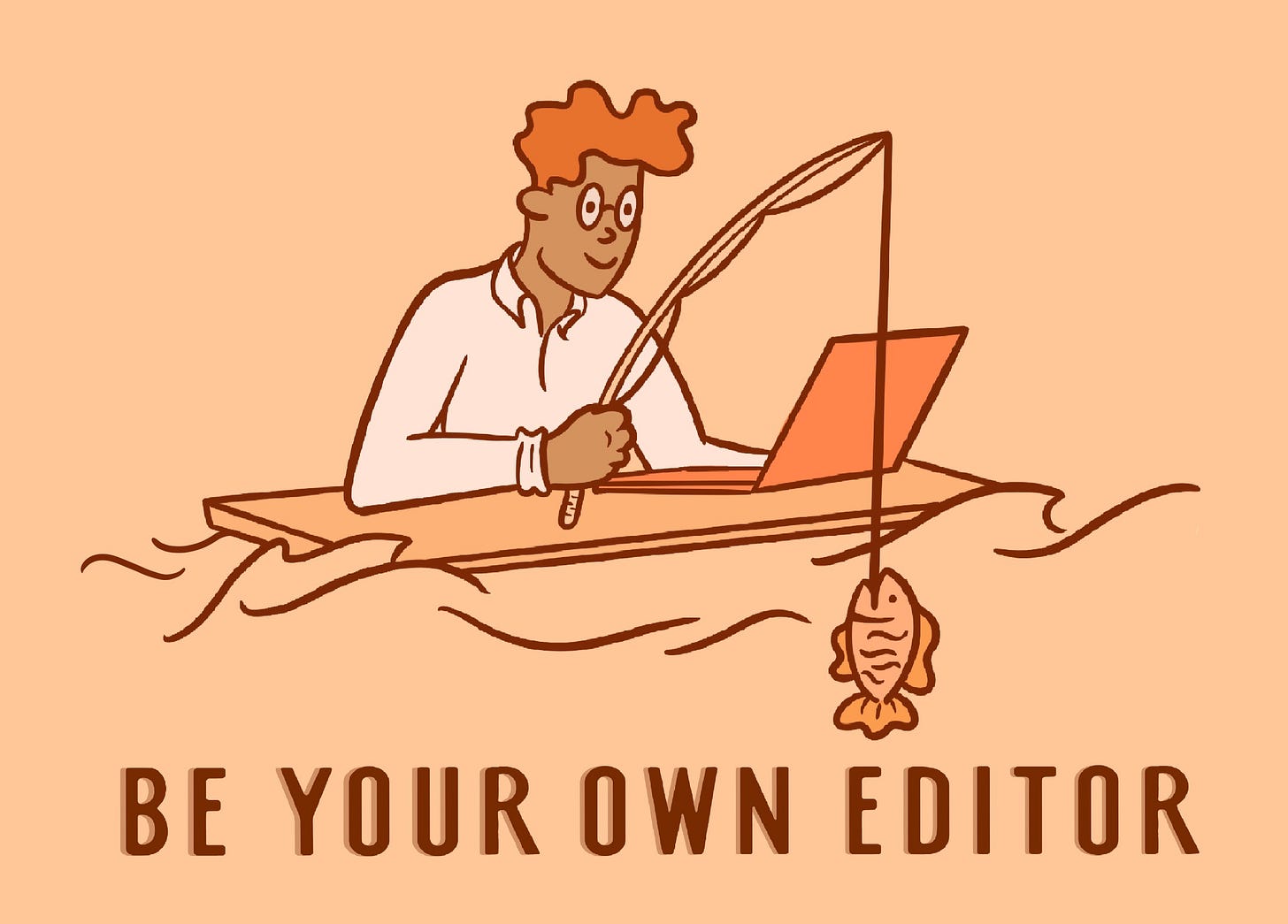Be Stunningly Concise! The gifts we give readers and ourselves by tossing back what’s not needed and loving it
A preview to get you started and a link to the full workshop
Enter the joyful, freeing practice of guiding your writing from draft to polished vision.
Who is this for?
Wanna
Explore why cutting our work can feel excruciating and how we can make it deeply satisfying instead (gifts for us)
Talk about the two main reasons conciseness honors readers (gifts for them)
Learn to love trimming your work to only what’s essential and meeting word count limits?
This workshop’s for you!
To watch the workshop and use the worksheets and resource links (plus access all these workshops)
Prefer to purchase a single workshop? Click here, select the $15 option, and email me for a link to the workshop and its resources.
Based on 20 years editing, patterns holding works back and prompts to usher them forward.
A preview. The art of pruning in three
1. A gift to readers
“Readers love to be trusted.” Thus began more notes to authors whose works I’ve content edited than I can count. What followed? “To remember,” “to understand,” “to decipher,” “to figure out,” “to empathize,” “to puzzle,”—to name a few.
We’re all readers. We know the thrill of discovery. What greater bliss than when a writer gives us just enough so we can deduce; so we can say, “Aha! I knew it”; so we can interpret, masters that we are of gleaning what roams below the surface. To be in on it is a pleasure. To be trusted with something as precious as a work’s secrets is to be honored.
We’re writers, too, so we also know the agony of cutting what we’ve labored into brilliance—fingers, hearts, and minds weary. To say nothing of the terror of not saying enough and leaving our readers lost and confounded. Take heart. The gift of trust is given to self-too. But first, not all we cut must be lost.
2. A place for the darlings
Hemingway’s iceberg theory is likewise familiar to authors whose manuscripts I’ve worked with. Yes, as writers, we must know every inch of the iceberg of our work. But just as importantly, we need to know where the waterline lies. In other words, while the whole iceberg is ours, only the tip is for the readers.
In A Moveable Feast, Hemingway wrote about lobbing off an entire (and dramatic) ending of a story to prove that all omissions strengthen a work. What I find intriguing about this theory is what it means about how much is happening beneath the surface—in other words, what we know but don’t say implicitly. Perhaps, then, the whole iceberg is for the readers after all.
At any rate, though I’ve no idea how the master of brevity would feel about this, I want to offer a better way than simply deleting whenever we find something we’ve rendered beautifully doesn’t quite belong above the waterline of a particular work. Wisdom has it those darlings must be killed. But I say keep them. Writer
, in a class on pitching, displayed the spreadsheet she uses to preserve her darlings. Perhaps they’ll be the tips of brand-new icebergs.3. A price tag to remember—but cut
Here’s the part about giving ourselves the gift of trust. First, there is the satisfaction that Francis Prose describes well in Reading Like a Writer. “For any writer, the ability to look at a sentence and see what’s superfluous, what can be altered, revised, expanded, and, especially, cut, is essential. It’s satisfying to see that sentence shrink, snap into place, and ultimately emerge in a more polished form: clear, economical, sharp.”
There is pleasure in trusting ourselves to trim and prune and toss back boldly. In my experience the more we do it—and the more we train ourselves to look at our own work as if someone else wrote it—the greater the ease. We can, in fact, learn to love pruning!
In The Writing Life, Annie Dillard says that including in a piece what isn’t pertinent to and in unity with its thrust is like leaving a price tag on a gift. What a pleasure to give a gift, remembering privately what it cost us, the love and labor we put into it, price tag removed.
What people are saying about the workshops
♥️🔥 If you’re on Notes and wanna restack this post, I would be ever so grateful. Thank you!
What qualifies me to offer these workshops? Over two decades, I’ve edited more than a thousand manuscripts, from memoir to fiction to self-help and lots in between. Whether as a developmental, content, or line editor or a co/ghost writer, I’ve seen my job as helping authors transform works they’ve knitted from the fibers of their beings into the best versions possible. Before that, I was briefly an award-winning journalist. I’ve written for clients ranging from question-answering systems to influencers to nonprofits. And I’ve overseen mini zines and small publications as managing/assigning editor.
What’s next?
Live Zoom! March 30, 2024, 9am PST. Wow with Your Choices
What else?
Replay! Reach New Writing Heights: Developing early drafts to firm up the scaffolding with strategic outlining
Replay! Reel in New Writing Depths: Getting the bones of early drafts right through deep questioning
Live Zoom! April 13, 2024, 9am PST. Polish & Publish
More coming in the fall. An annual subscription locks you in for all of that. Each workshop stands on its own. Come to or watch whichever calls to you.
All artwork for the Rolling Desk is by the crazy talented Alexandra Rickards. Check out her art and think of her for your project needs!










